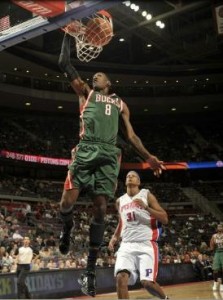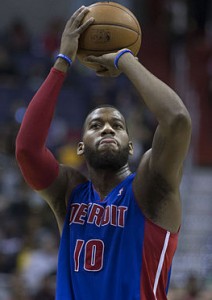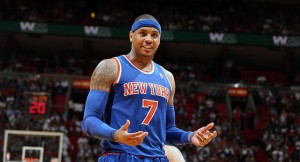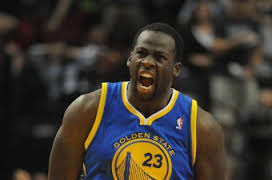 Kevin Arnovitz of ESPN.com has written a really important piece about mental health in the NBA. The piece’s main subject is Larry Sanders, but it’s this opening passage that I’d like to highlight:
Kevin Arnovitz of ESPN.com has written a really important piece about mental health in the NBA. The piece’s main subject is Larry Sanders, but it’s this opening passage that I’d like to highlight:
“We don’t do a very good job with mental health,” said an NBA team executive as he looked down at the sad contents of his boxed lunch and sighed. “We don’t have any answers, and we’re not doing a good job looking for them.”
This was three years ago at the MIT Sloan Sports Analytics conference in Boston. I’d asked about the status of a player who had had some early success but had fallen off the NBA map after a short stint with the exec’s team.
He lamented that, too often, he and his head coach were charged with the job of evaluating and counseling guys who, in his estimation, were likely suffering from mental health conditions that professionals should be diagnosing, then treating. The exec said that he had taken it upon himself to read up on current trends in brain research but that he was in far over his head.
About 15 months later, a general manager from a different team called and vented about his helplessness with a recent signee who, he suspected, was grappling with mental health issues. The player was visiting an independent psychologist not associated with the team, but his problems persisted. The league offered mentorship from player-development specialists who were well-versed in advising players on how to handle their newfound wealth and family issues, but the GM said it probably wasn’t enough. Hunting for a solution, he approached the team owner about investing in a mental health program for his new signee.
“I just gave him $30 million worth of mental health,” the owner said.
Two months later, the general manager enumerated additional concerns he had, including the ineffectualness of the players’ union in pushing for mental health reforms and a league substance abuse policy that punished players for smoking weed, but didn’t do an adequate job of addressing underlying mental health issues that might be driving the offending player to self-medicate.
Mental health in the NBA is a difficult issue to speak about openly. Teams and psychologists are bound by a code of confidentiality, making it nearly impossible to share stories of players’ successes or struggles. And as sympathetic as a team executive might be to a player with a mental health condition, his performance is ultimately judged on the productivity of those he puts in the locker room. The slightest inkling that a draftee or free agent might have a condition that could make him uncoachable or strain locker room chemistry usually means it’s best to look for an equivalent talent who can perform the job without the baggage. And from the perspective of many owners — in any industry — mental wellness is something that’s priced into compensation. Want worker’s comp for your troubles? Check your direct deposit.
Anxiety and depression are very real issues, even among the young, rich, and successful demographic that NBA players generally fall into. And money will never change that, any more than throwing money at a broken leg will cause it to heal itself.
Mental illness can ruin your life, no matter who you are. You can be seven feet tall, a freakish athlete with an unstoppable low-post game, and mental illness won’t care. It’ll make you feel like nothing is ever going to be right, and it’ll convince you that the things that are good are not good at all.
The scary thing is that there’s no way Larry Sanders (or Royce White) is the first player to struggle with severe mental health issues. How many guys suffered in silence, or had promising careers derailed by mental illness? How many of those players’ illnesses could have been treated? It’s time to actually support players like Larry Sanders, not just for basketball, but because it’s the right thing to do.
Now, the latest news from around the NBA:
KNICKS LIKELY TO TARGET GREG MONROE
 This feels to me like it’s about as high as the Knicks can realistically aim, but also fairly unlikely. Monroe should have plenty of suitors, including staying with a Detroit team that could be just about to hit its stride. What can the Knicks really offer him that Detroit, or another team, can’t? Is playing with Carmelo Anthony or for Phil Jackson really that big a draw to a guy who can almost name his destination?
This feels to me like it’s about as high as the Knicks can realistically aim, but also fairly unlikely. Monroe should have plenty of suitors, including staying with a Detroit team that could be just about to hit its stride. What can the Knicks really offer him that Detroit, or another team, can’t? Is playing with Carmelo Anthony or for Phil Jackson really that big a draw to a guy who can almost name his destination?
Marc Berman of the New York Post:
Pistons general manager and coach Stan Van Gundy had a chance to lock up burly power forward Greg Monroe last summer with a long-term deal when he became a restricted free agent. Now Detroit could be burned.
Despite all the talk about the Knicks’ 2015 cap space, several league executives think they’re going to have a hard time landing players given their bleak situation. They do believe the Knicks have a legitimate shot at two guys — Long Island’s Tobias Harris and Monroe.
Van Gundy and Monroe — and agent David Falk — were unable to strike a deal last summer. Falk couldn’t find one elsewhere either. It is believed teams were leery the Pistons would match any offer anyway, and Falk decided it was best to ride it out until 2015 when more teams had cap space, including the Knicks and Lakers.
Monroe, the former Georgetown stud, ended up signing Detroit’s one-year, $5.5 million qualifying offer.
In November, with the Pistons owning one of the league’s worst records, reports surfaced Van Gundy wanted to ship out Monroe for a first-round pick.
Detroit’s post-Josh Smith renaissance has changed those plans. Now Monroe is in position to score big in July and the Knicks are expected to be hot on his trail. He is unrestricted, meaning the Pistons can no longer match an offer.
There are some who think Monroe can command a maximum contract — which, for his years of service, would start at $15.7 million.
Monroe was coy about his free agency, but did let it slip he thinks the Knicks’ Derek Fisher will become “a great coach.’’
BATTIER: MELO ‘HAS NOT BEEN ABOUT REINVENTION’
 Personally, I’m a sucker for hearing players talk about what they think about on defense. It doesn’t show up much, but when it does, it’s easily my favorite thing to read: what strategies work against which players? who’s the most unpredictable? That’s why I really like this article from Brett Pollakoff of ProBasketballTalk:
Personally, I’m a sucker for hearing players talk about what they think about on defense. It doesn’t show up much, but when it does, it’s easily my favorite thing to read: what strategies work against which players? who’s the most unpredictable? That’s why I really like this article from Brett Pollakoff of ProBasketballTalk:
While he admitted having difficulty guarding the game’s elite scorers regardless, there was one player that was so predictable in the way he played that Battier felt good in his ability to consistently shut him down: Carmelo Anthony.
“I had some success against him,” Battier said. “The numbers really play out with him, and as he’s gotten older, he has not been about reinvention. The last two years I played him, he did exactly what the scouting report said he was going to do, every single time.
“A lot of players will deviate — Kobe was so tough in his prime, or Durant or LeBron. But Carmelo, I knew what he was doing. He was on the left block, he’s going to dip his right shoulder and go to his left hand every single time — he travels every time, by the way; he travels every single time. But if I made him use his right hand and go over his left shoulder, he didn’t want to do that. And as a result, I was able to drain his efficiency.”
…
“The only time he got me was, he had the most unbelievable game,” Battier said. “This was like, the outlier of all outliers in terms of the numbers and analytics. He scored 50 points, and didn’t have one paint point. So, yeah. I was really feeling good about ‘any long non-paint two is a good shot’ after that game, right? He scored 50 points on me, ZERO paint points. As far as the numbers were concerned, I always enjoyed Carmelo, because he knew what he was,” Battier said. “And he wasn’t apologizing for it; he’s really good at it. It was always fun to intellectually pit the numbers against his game.”
 DRAYMOND GREEN FIRES BACK AT BARKLEY
DRAYMOND GREEN FIRES BACK AT BARKLEY
More Charles being Charles this week, but this is still pretty fun, thanks to Draymond.
Diamond Leung of the Bay Area News Group:
Draymond Green caught wind of TNT studio analyst Charles Barkley’s comments that the Warriors forward was small and not “tough enough” as Golden State lost to Cleveland.
Green fired back Saturday once again after previously having disagreed with Barkley’s characterization of the Warriors as a jump-shooting team that couldn’t be counted on to win an NBA championship.
“I think he was shorter than me. You would think he would support me,” said Green, who at 6-foot-7 noted he used to watch tape of Barkley’s playing days to improve himself. “But hey, maybe he thinks I can’t win one (championship) because he ain’t got one. So if he’s the same size, and he can’t win a championship, we’ll see what happens. I’ve got a lot more years to do it than he’s got, you know?
“A guy who’s not a champion can’t talk too much about championships, can he? I’m not sure how much he won anything in his career team-wise. Been to the finals, but… For him to say that – they won’t win because he’s too small – maybe that’s why he didn’t win. Because he was too small.”
I don’t know what exactly was wrong with Larry Sanders (I had thought it involved drugs and alcohol, which would only make the existing problem worse), but Royce White was supposed to suffer from Panic Disorder + OCD. Panic disorder can be easily treated with minimal side effects (reduced libido). The problem is that based on his tweets and including some that I had with Royce, is that he didn’t want to take any medicine. He thought he knew better than anyone else (it was obvious from his many tweets), including those that warned him that if he really wanted to help those with mental disorders, he should have done what the doctors told him. In that case it could have allowed him to have a successful forum while in the NBA. Instead Royce Young would receive thousands of tweets from people (with various mental disorders), encouraging him to continue to fight, and resist what the NBA was telling him. Its really a shame, because for about $100 (at Costco) he could get an annual supply of Paxil (daily) and Lorazepam/Ativan (as needed) that should have eliminated any Panic Attacks and reduce (can’t eliminate) his OCD symptoms.
I don’t feel sorry for him. I do feel bad for the millions of people who don’t know that they suffer from Panic Disorder and Obsessive Compulsive Disorder. It shouldn’t be expensive to teach people how to recognize the symptoms.
The truth is that taking a flight (as in the case of Royce White) IS a good reason to be scared. However, he’s done it before and with the medicine, there should be no reason to have attacks. It was his choice and he lost.
As far as a more serious disorder like BiPolar, again there is medicine. However it’s much more complicated and the key is to stick with the recommended treatment protocol (nothing is perfect) and for others to learn to tolerate mood swings. Everyone on those medicines understandably thinks they can get off of them – but it doesn’t work that way. If they want to experiment with their own medications, then maybe they shouldn’t be in the NBA (they can experiment after they retire or when better medications might be available).
And No I’m not a medical doctor, but I’ve seen enough of these ailments first hand to spark a discussion. And EVERYONE needs to learn more about these disorders and the treatments available, rather than just writing articles about how lots of money needs to be thrown at the problem, without any details. With the time spent arguing about the need to spend money, people can be taught some of the specifics, and the best way is to observe people who do have these disorders.
2. Regarding the Knicks in the free agency, maybe they will throw a max contract after Rondo, because I doubt the Mavs will.
They could be competing with the Lakers, however. Also, the Celts wanted to offer near Max money for Rondo, and he declined. So then would Rondo want to play for the worst team in the NBA right now?
I agree though that Monroe will probably stay with the Pistons.
So… what you’re saying is that you aren’t a doctor, don’t have any personal experience with OCD or an anxiety disorder and don’t know what Larry Sanders has wrong with him, but you’re telling everyone to learn more about the situation?
Not true about my not knowing anything about those disorders. I know a lot about those 2 disorders (first hand as I stated) and have witnessed the effects of BiPolar with someone who was working for me, and also knowing of several suicides.
And my wife IS a medical doctor and I run her small medical practice, so I await someone to make a useful comment that adds to this important discussion. However, just being a MD (say a typical surgeon) doesn’t mean much, if not dealing with those issues first hand. I would much more respect the opinion of say a nurse, who is married to someone with one of these disorders.